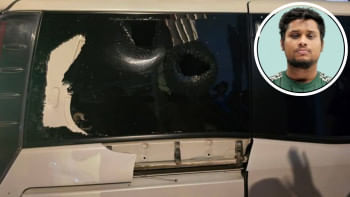Solidarity in grief, united in resolve

The unthinkable has happened. The worst fears have come true. The nation is shocked by the barbaric acts of a handful of young men. Emotion has engulfed us for the right reasons. Bangladesh has yet again grabbed the world headlines for the wrong reasons. Not long ago, we used to proudly announce that Bangladeshis are peace-loving and tolerant, the ubiquitous smiling-face that welcomed foreigners into our midst and made them feel at home. Alas, the incident of July1, 2016, has now starkly revealed so many hard realities! We have lost many precious lives - Italians, Japanese, Indian and Bangladeshis - who had dedicated their lives to the well-being and prosperity of Bangladesh. They are gone forever but can we, as a nation step back and reflect?
Looking at the faces of the victims and perpetrators, I am struck by their age and socio-economic background. They are our children and our future. One group of young people is moving forward educationally and will become our new leaders in different sectors. The other group has become alienated and is espousing radical ideology, a trend not just confined to Bangladesh. Why are we losing our boys and girls in this way? What is motivating them? How are we, as a society, failing them in their aspiration? Are we giving sufficient time and space to vent their grievances? Is the transition from an agrarian society to a digital one becoming too traumatic for many among us? As parents, are we losing touch with our children? There are many questions that come to mind. As parents and families, we have to candidly ask such questions but this will call for a concerted effort with leadership coming from all levels. Are we ready for this serious self-examination and self-correction?
The other issue, which has struck me, is the straitjacket diagnostic that has become the norm in this age of 'fight against terror'. 'Pundits' are giving sophisticated ideological interpretations, and no doubt there is much value to this and is necessary. But is there a more down-to-earth explanation that we are ignoring? The long arms of ISIS and Al Qaeda have reached Bangladesh, and there is certainly some truth in this. We all are aware of the destructive nature of these organisations, and their selective interpretation of Islam has become their trademark. The majority peace-loving Muslims of this world will have to take a stand. It is apparent that many thousands of innocent Muslims, along with non-Muslims, have already paid heavily, and will continue to do so in the years to come until we have collectively succeeded in winning over the hearts and minds of the alienated youth. Rather than looking for complex theories and getting trapped in sophistry, let us be honest with ourselves and call a spade a spade. The truth is that the present crisis is a predominantly home-grown creation, and the commitment to resolve has to come from within Bangladesh.
The other, and probably, the most important factor is our own resolve to work together, as a society. This is the time to come together, particularly politically. Unfortunately, the global trend is not helpful. Even in a mature democracy like the United Kingdom, we find much dissension and distrust. But there are also some very positive lessons to be taken: coming together in grief on the shocking killing of the young and compassionate British MP, Jo Cox; acceptance of the verdict of the Brexit referendum despite the close call; and making way for new leadership within the UK ruling party. In Bangladesh, we are facing different issues within a complex context. But despite the complexity of our situation in Bangladesh, our expectation is that our politicians will set aside the past differences and work together on some of the key national interest issues, such as, the youth of Bangladesh. If we fail, the dissatisfied youth of Bangladesh will remain very vulnerable. For the sake of the future of the generations to come, we have no other option but to stand shoulder to shoulder to face the present crisis, some will say, our existential moment. As the victims are being buried all around the world, we stand in vigil and resolve wholeheartedly to work together for a more attractive and meaningful future, particularly for the young men and women of Bangladesh.
The writer is a barrister and Executive Director of the South Asian Institute of Advanced Legal & Human Rights Studies.

 For all latest news, follow The Daily Star's Google News channel.
For all latest news, follow The Daily Star's Google News channel. 



Comments